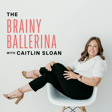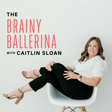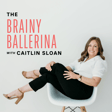
25. Nourishing Dancers: a Conversation on Nutrition, Body Image, and Eating Disorders with Registered Dietitian Monika Saigal
Monika Saigal is a Registered Dietitian Nutritionist, Certified Eating Disorders Specialist, and former professional dancer. She specializes in dancer wellness and the prevention and treatment of eating disorders/disordered eating. She is also the author of the new book Nourishing Dance: An Essential Guide on Nutrition, Body Image, and Eating Disorders.
From periods to carbs, Monika and I debunk so many myths in this conversation. Dancers have a three times higher risk of having an eating disorder than non-dancers and even if you have the best of intentions you may unknowingly be causing harm.Tune in to this conversation for actionable advice on what we can do to help prevent the occurence of eating disorders in dancers including paying attention to early signs and symptoms, how to set up a positive dance environment and immediate language shifts you can make. Knowledge is power and with it we can begin to make lasting change in the dance industry!
Key Moments:
- How Monika began her career as a Registered Dietitian for dancers [1:50]
- What is diet culture? [6:28]
- Factors that increase the risk of eating disorders in dancers [7:47]
- The difference between eating disorders and disordered eating [10:23]
- When dancers should ask for help if they’re struggling (and where they can seek help) [12:14]
- What we can do to create a positive dance environment [16:30]
- What can be done to help prevent the occurence of eating disorders [20:46]
- Early signs of symptoms of an eating disorder and what steps should be taken if you’re concerned [23:13]
- The short and long term consequences of underfuelling [27:17]
- The importance of having a regular menstrual cycle for elite athletes [33:45]
- How dancers can fuel optimally to support their dancing [36:40]
- The importance of carbohydrates [38:23]
- Her biggest piece of advice for dancers pursuing a career [44:20]
Connect with Monika:
MONIKA’S WEBSITE: msnutrition.com
NOURISHING DANCE BOOK WEBSITE: nourishingdance.com
FACEBOOK: facebook.com/MonikaSaigalRD
INSTAGRAM: instagram.com/nourish.headtopointe
Links and Resources:
National Alliance for Eating Disorders: allianceforeatingdisorders.com
IADMS: https://iadms.org/find-a-provider/
Get your copy of The Ultimate Audition Guide
Join the Brainy Ballerina Book Club
Get your copy of Nourishing Dance: An Essential Guide on Nutrition, Body Image, and Eating Disorders (affiliate link)
Let’s connect!
My WEBSITE: thebrainyballerina.com
INSTAGRAM: instagram.com/thebrainyballerina
1-1 CAREER MENTORING: book your complimentary career call
Questions/comments? Email me at caitlin@thebrainyballerina.com


